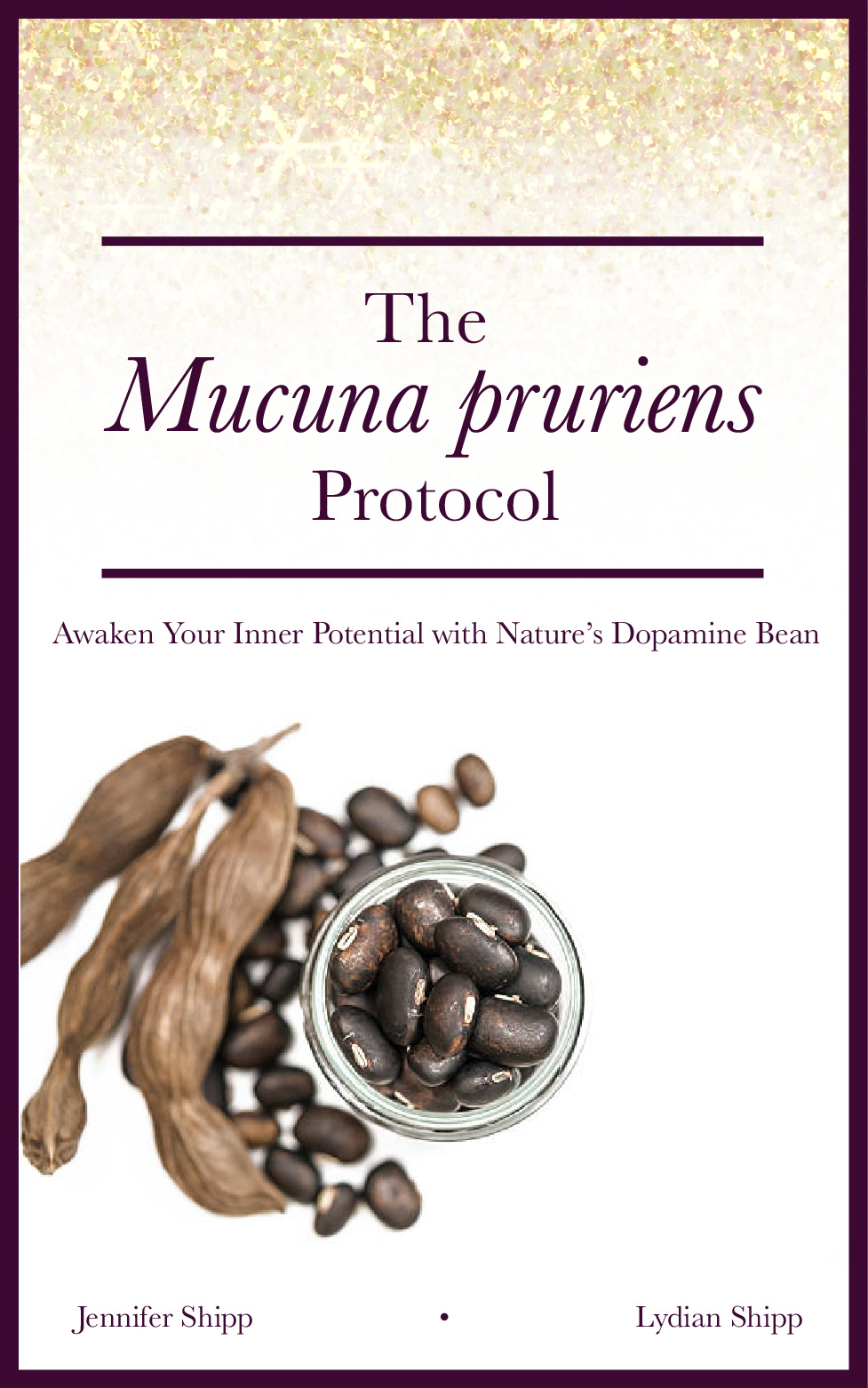Understanding Dopamine and Alcohol Addiction Recovery
Most people who struggle with addiction have heard of dopamine as a neurotransmitter that plays a role in addiction. The idea of “dopamine hits” is something that became mainstream when social media was exposed for creating algorithms that specifically targeted people’s dopaminergic system to make social media platforms addictive. But the Dopamine Model of Alcoholism and Addiction is often not explained very well through mainstream media and the logic of this model — or rather, the lack of logic in the mainstream version of this model — is exploited to make people afraid of having too much dopamine. At this point in my career, I’ve read so many deranged models of dopamine in terms of addiction that I can’t even count them all. These theories don't make sense if you really study them -- they exist only to confuse people and make it easier to take advantage of them. If you begin collecting different versions of the Dopamine Model of Addiction online, you’ll find that there are many of them and few of them make sense when compared to the others. In other words, if you sat down and took notes on the top 10 Google results for a “dopamine and addiction” search, you’d find that none of them say the same things as the others. Though there has been a huge amount of research done on dopamine-related disease processes including addiction, but also Parkinson’s and Lewy Body Dementia, it’s like the major health syndicates have no idea how dopamine works. It’s worth noting though, that Delirium Tremens (DTs) has much in common with advanced Parkinson’s disease and Lewy Body Dementia. These two diseases (Parkinson’s and Lewy Body Dementia) are two sides of the same coin. Click here to read more about Parkinson’s Disease and Lewy Body Dementia.If you’re a recovering alcoholic, it’s important to note that your neurons won’t make too much dopamine though there are drugs that can cause those neurons to release too much dopamine (most stimulants are among them). Dopamine by itself, essentially, is not the bad guy in terms of dopamine production, but let’s explore dopamine a bit more in terms of alcoholism itself to highlight the logic of this model and how it actually works in terms of alcoholism treatment at home.
Dopamine and Alcohol Addiction
Dopamine is a neurotransmitter. This neurotransmitter is closely related to melanin, the substance that colors the skin, eyes, and areas of the brain where dopamine in neurons are particularly dense. Melanin, the stuff that makes your skin tan (or not), in fact, is formed spontaneously from dopamine as well as from noradrenaline, adrenaline, L-tyrosine, and L-dopa. Each melanocyte (the cells where melanin is stored) is also connected directly to the autonomic nervous system via tiny nerves. The melanocytes communicate with the autonomic nervous system about things like light and dark, coolness and hotness of the environment (among other things) and then the autonomic nervous system takes this information to the pineal gland.Click here to read more about how to decalcify the pineal gland if you with to treat insomnia due to alcoholism naturally.
It’s worth noting here that while melatonin levels are blunted during alcohol intoxication, studies indicate that insomnia during alcohol withdrawals does not seem to be caused by disturbances in the pineal gland. It seems, according to the current research, that the pineal gland continues to function relatively normally during alcohol withdrawal. On the other hand though, if the melanin production has been diminished due to a lack of dopamine (due to a lack of the nutrients used to produce dopamine in the body), this lack of healthy melanin may make it hard for the body to notice the subtle changes in terms of light and dark to cue a person to sleep normally after alcohol addiction. Click here to read more about how to rebuild the dopamine system as a natural treatment for insomnia due to alcoholism.
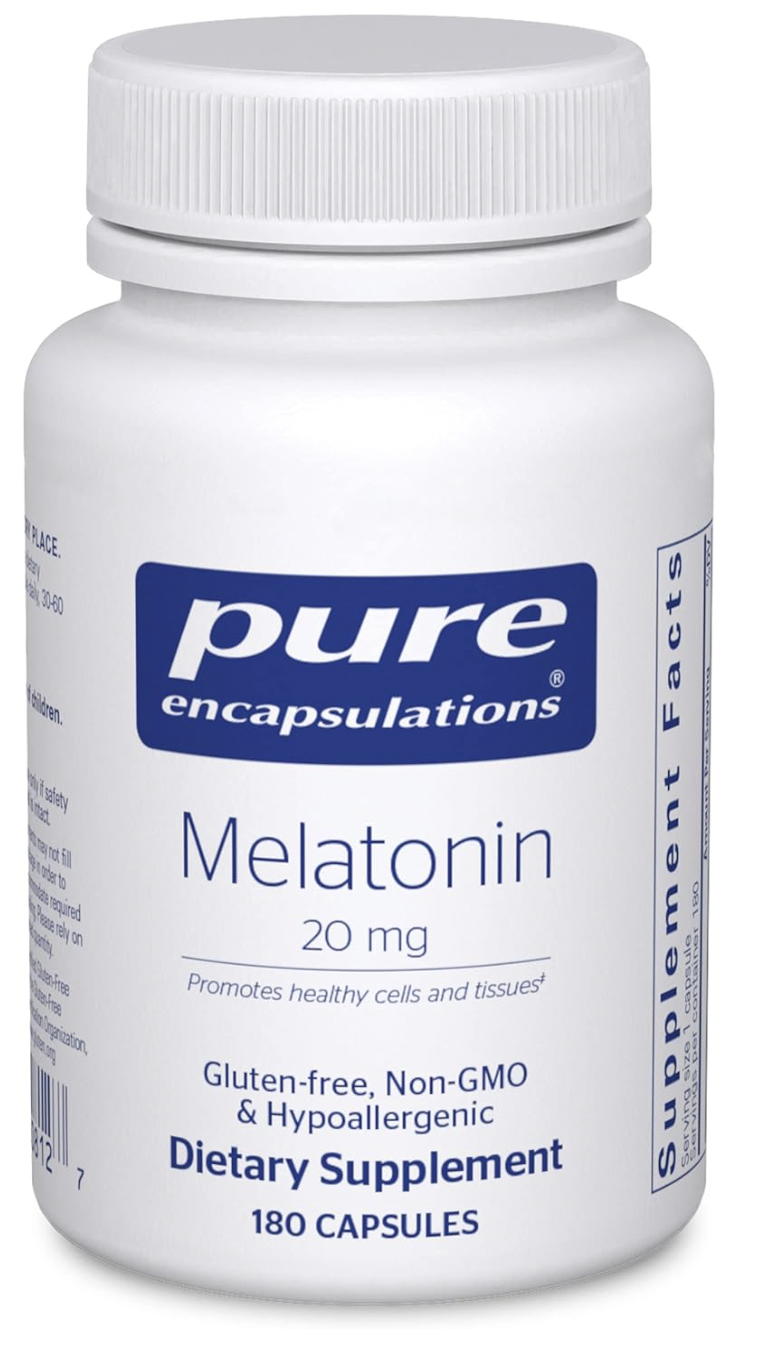 Drinking alcohol during exposure to sunlight can make people feel more drunk in part due to dehydration, but there may be more at play here, given the relationship between dopamine and melanin. If your body is deficient in dopamine, it is likely also deficient in melanin. If it is deficient in melanin, your body may not be able to synchronize itself with day and night, which could lead to insomnia and daytime grogginess. Melanin deficiency would leave your body open to various forms of negative radiation but there are positive forms of radiation that the body also needs that would be unavailable. In summary, one’s basic connection to day and night would be disrupted because of the lack of dopamine and in turn, the resulting lack of melanin in the skin to detect day and night. This is no small thing. Getting healthy sleep is vital for alcoholism recovery at home. If you are looking for a treatment for alcoholism insomnia, try a free trial of Eye Movement Desensitization and Reprocessing / EMDR, a daytime treatment that involves eye movements that mimic deep REM sleep eye movements. Also, work to rebuild the dopamine system in the body while paying special attention to your sleep hygiene. Administer melatonin at a dose of 20 mg an hour before light’s out and halfway through the night if you wake up. Make sure your bedroom is completely dark and don’t look at any computer screens or phone screens once you turn out the lights.
Drinking alcohol during exposure to sunlight can make people feel more drunk in part due to dehydration, but there may be more at play here, given the relationship between dopamine and melanin. If your body is deficient in dopamine, it is likely also deficient in melanin. If it is deficient in melanin, your body may not be able to synchronize itself with day and night, which could lead to insomnia and daytime grogginess. Melanin deficiency would leave your body open to various forms of negative radiation but there are positive forms of radiation that the body also needs that would be unavailable. In summary, one’s basic connection to day and night would be disrupted because of the lack of dopamine and in turn, the resulting lack of melanin in the skin to detect day and night. This is no small thing. Getting healthy sleep is vital for alcoholism recovery at home. If you are looking for a treatment for alcoholism insomnia, try a free trial of Eye Movement Desensitization and Reprocessing / EMDR, a daytime treatment that involves eye movements that mimic deep REM sleep eye movements. Also, work to rebuild the dopamine system in the body while paying special attention to your sleep hygiene. Administer melatonin at a dose of 20 mg an hour before light’s out and halfway through the night if you wake up. Make sure your bedroom is completely dark and don’t look at any computer screens or phone screens once you turn out the lights.
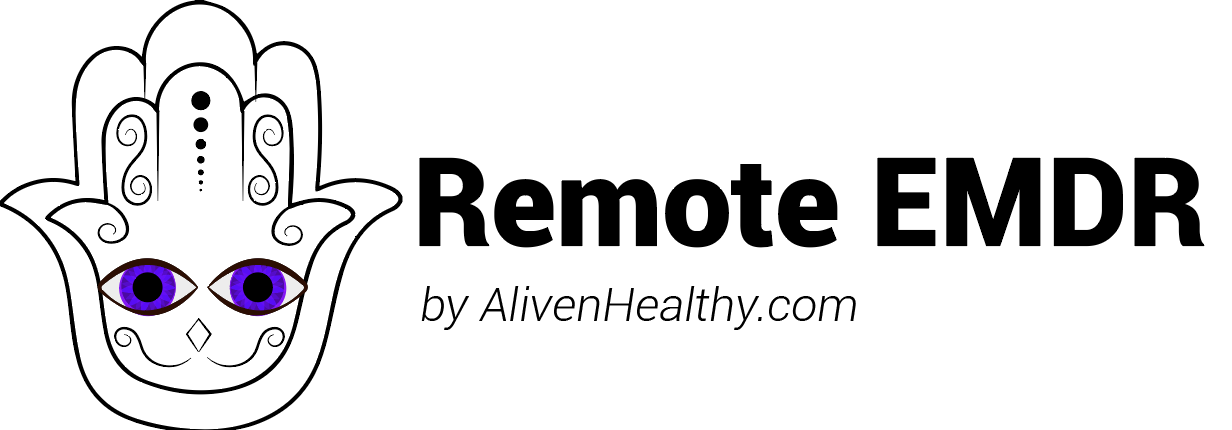
Click here to do a free trial of EMDR online.
Dopamine is produced from nutrients in the diet or from specific nutrients that are taken as supplements. Nutrients like the B complex vitamins, magnesium glycinate, zinc + copper, L-tyrosine, and L-dopa all exist naturally in food and they are used by the body to produce dopamine. For example, L-tyrosine and B complex vitamins are present in meats like chicken or beef. L-dopa (the nutrient, not the pharmaceutical drug, which is chemically very different from L-dopa as an amino acid) is present in fava beans and related types of beans such as Mucuna pruriens and Kudzu. Magnesium and zinc are minerals that are present in Himalayan sea salt and so on and so forth. If one of the nutrients that the body needs to produce dopamine is not present in adequate quantities, or if the body can’t absorb the nutrient, dopamine production is limited. This, in turn can lead to melanin production problems and in turn sleep problems. Difficulty sleeping during alcoholism recovery (or after recovery) can make it hard for the body to release trauma and heal at the level of the autonomic nervous system. Getting a good night of rest can make a huge difference in terms of a person’s mood and mental health during the day.
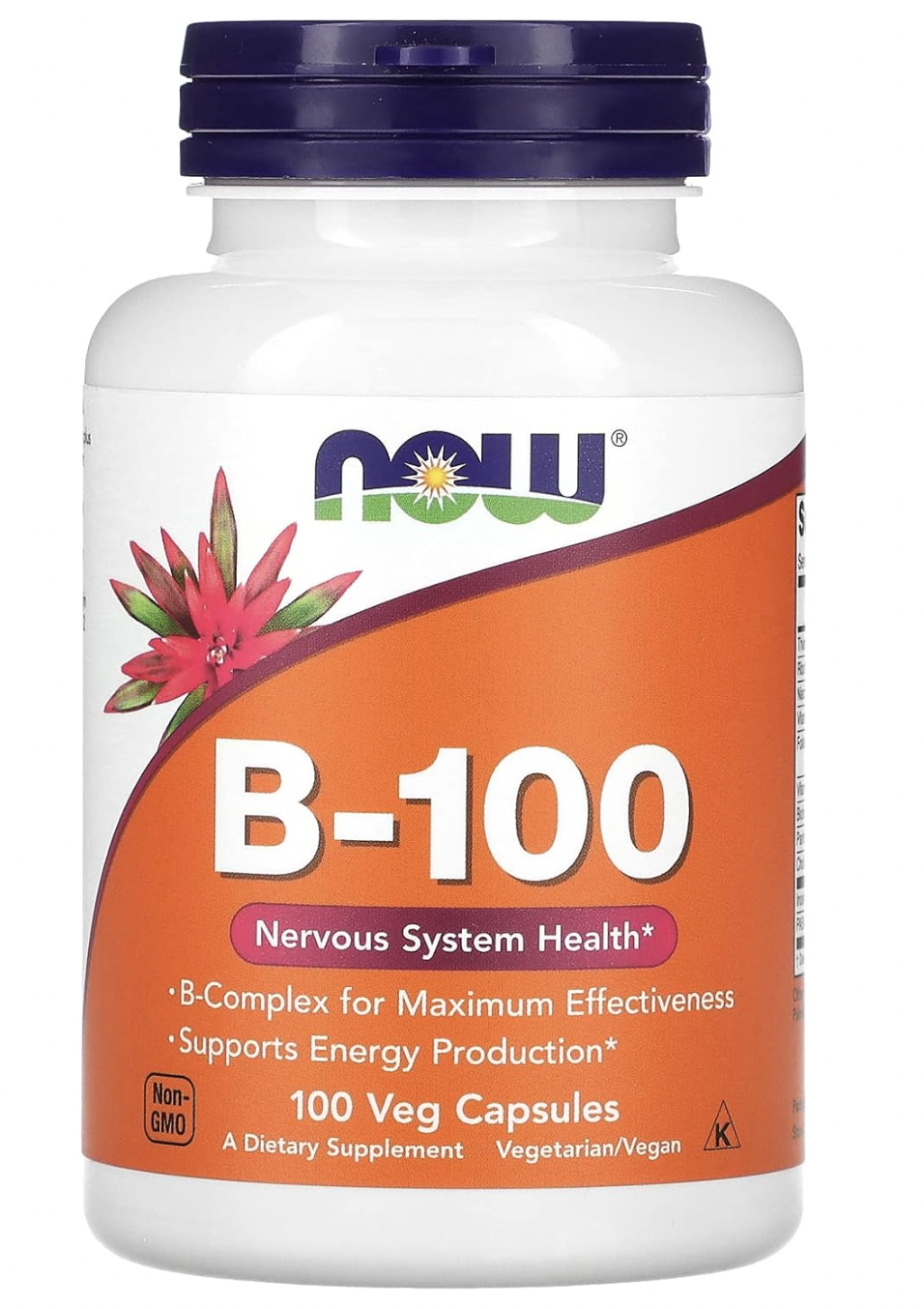
Click here to buy Vitamin B100 Complex vitamins for alcohol addiction.
It isn’t hard to imagine how a nutrient deficiency could easily lead to a dopamine deficiency. If a dopamine deficiency occurs, the body becomes needy in a very general way.Dopamine, in fact, is supposed to be ever-present in our neurons and be released as a slow-drip into the synaptic space between the neuron and the dopamine receptors that soak up the dopamine. If we think of the dopamine receptors like they are flowers, that slow drip of dopamine from the neuron into the synapse keeps the flowers properly watered and hydrated. A drought of dopamine from the neuron can cause some of those flowers to wither up and die. But also of concern are drugs like methamphetamines, caffeine, refined sugars, and other substances that cause a massive release of dopamine all at once. A massive release of dopamine causes a “flood” that also kills dopamine receptors while simultaneously leaving neurons empty of any dopamine with which to provide that essential slow drip for the receptors. Addiction to stimulants is based to a large extent on dopamine receptor death caused by the cycle of dopamine flooding and drought (with no slow-drip to keep those dopamine receptor-flowers properly hydrated). In alcoholism, however, dopamine drought seems to be caused by nutrient deficiencies that make it hard for the body to produce dopamine in proper quantities. The resulting dopamine drought then kills dopamine receptors. Alcoholics need to work with Mucuna pruriens (6000 mg per day) and Kudzu (2000-4000 mg per day) to regrow their dopamine receptors over the course of 5-6 months.
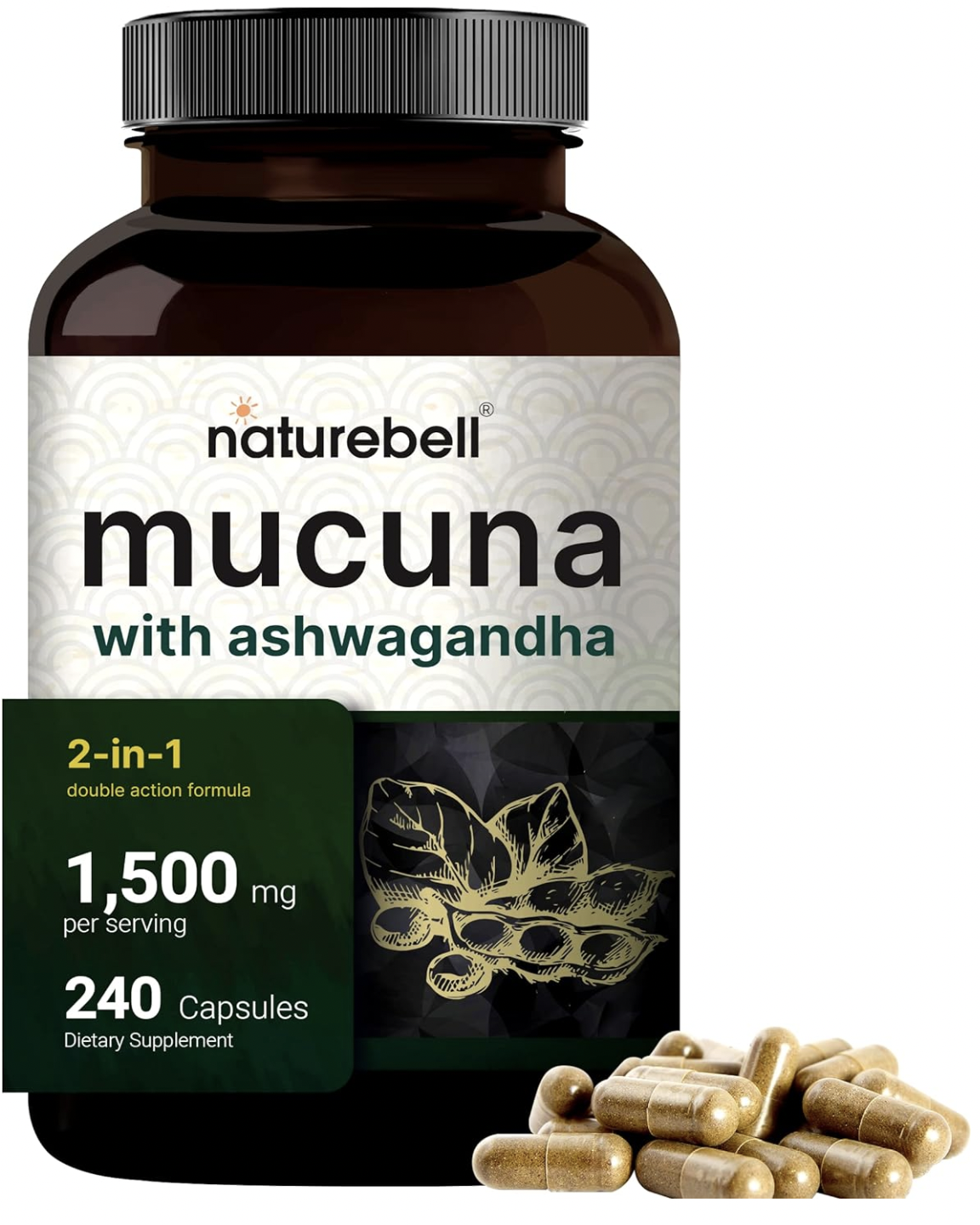
Click here to buy Mucuna pruriens.
While alcoholics can often benefit from taking an herb like Mucuna pruriens that provides dopamine precursors and nutrients to ensure that dopamine neurons are properly filled with plenty of dopamine at all times (to produce that slow and steady drip to regrow dopamine receptors), the herb Kudzu is often more helpful than Mucuna for alcoholics because Kudzu reduces insulin resistance in addition to its ability to provide the body with dopamine precursor nutrients. If you can, take both Mucuna and Kudzu for alcohol addiction. We’ll talk more about insulin resistance below, but for now, let’s earmark the idea that insulin is a hormone that functions like a guy with a skeleton key to open up human cells of all kinds and to allow nutrients, medicines, and other helpful substances into cells to keep them healthy and functioning properly. Though someone who is addicted to stimulants may be able to quickly kick an addiction to methamphetamines using Mucuna pruriens and supportive nutrients, alcohol addiction requires a nod to the problem of insulin resistance too through the use of herbs like Kudzu, trace minerals, and other nutrients that support insulin function and nutrient transport into the cells in the body.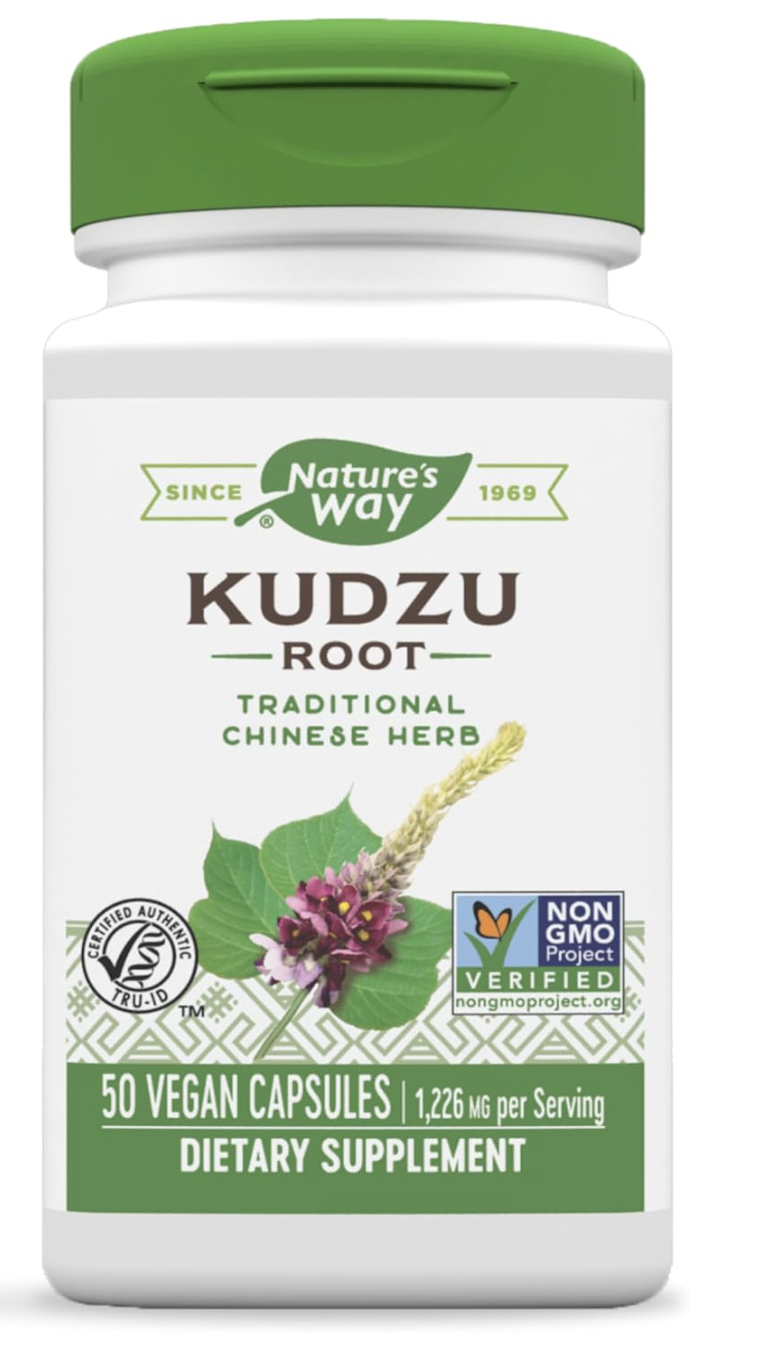 In a person with insulin resistance, dopamine production can be stalled or halted by a lack of nutrients inside the cell. In other words, if you take supplements and eat a healthy diet, but your body is insulin resistant, your cells, specifically your neurons, may not be able to take in those nutrients to build dopamine. Nutrient deficiencies tend to make people feel needy and these deficiencies set the alcohol addict up to feel cravings. Mitigating this problem through nutrient supplementation can make a huge difference in terms of reducing alcohol withdrawal symptoms naturally. Drinking plenty of water with trace minerals prevents dehydration at the same time which can prevent a recovering alcoholic from becoming thirsty, which can trigger the desire for alcohol.
In a person with insulin resistance, dopamine production can be stalled or halted by a lack of nutrients inside the cell. In other words, if you take supplements and eat a healthy diet, but your body is insulin resistant, your cells, specifically your neurons, may not be able to take in those nutrients to build dopamine. Nutrient deficiencies tend to make people feel needy and these deficiencies set the alcohol addict up to feel cravings. Mitigating this problem through nutrient supplementation can make a huge difference in terms of reducing alcohol withdrawal symptoms naturally. Drinking plenty of water with trace minerals prevents dehydration at the same time which can prevent a recovering alcoholic from becoming thirsty, which can trigger the desire for alcohol.
In any case though, the lack of dopamine causes neediness to occur. Some might say the sensation of neediness is equivalent to a craving. Often, people crave substances that resemble or that actually have medicinal effects, albeit effects that may or may not last. In alcohol addiction, people crave alcohol because in low doses at infrequent intervals, alcohol actually lessens the problem of insulin resistance and improves insulin functioning in the body according to a number of studies.
This effect that alcohol has on the body, albeit in low doses and only when taken infrequently, is enough to set off a chain reaction that makes people who are prone to alcohol addiction, easily drawn to this substance in particular. A person who has insulin resistance has one drink of alcohol at a low dose. On a subconscious level, they realize that there’s a connection between this one drink of alcohol and feeling generally better on a physical level. The subconscious mind then begins to seek out alcohol to try to duplicate that initial experience with a low dose of alcohol. Unfortunately, drinking alcohol in low doses every day does not produce the same results time and again. The effects, in the beginning stages of alcohol addiction, are intermittent, which also impacts the dopaminergic system. When those initial low doses of alcohol work to make the physical body feel better (via the action of insulin opening up the cells to nutrients that are perhaps present but not absorbable due to insulin resistance), dopamine neurons spit out “hits” of dopamine which allows the brain to take note. Dopamine, after all, is the decision-making neurotransmitter. It is the neurotransmitter that provides the fuel our brains need to notice whether a given experience, situation, thing, relationship, etc. is good for us or bad for us. It takes quite a bit of fuel for our brains to be able to take note of what’s positive and what’s negative and to assess whether we should seek or avoid a given unit of our human experience. So, initially, in the early stages of alcohol addiction, dopamine is there to observe our experiences in the world. Each time alcohol works well to make the body feel better, dopamine notes that alcohol provided a positive experience. Unfortunately though, dopamine gets depleted quickly when the proper nutrients cannot be absorbed by the cells and it gets depleted by anything (like sugar or caffeine) that causes a big flood of dopamine to be released from the neuron in a quick burst. Alcohol, like sugar, can cause a flood of dopamine to be released from the neuron. Once dopamine is depleted, our good-decision-making efforts start to fail and we begin to operate more like zombies in the real world. To get control over yourself as an alcoholic means first rebuilding your dopamine system through good nutrition, nutritional supplements, and herbs or amino acids that are used to build dopamine naturally. Click here to read more about what causes alcoholism.
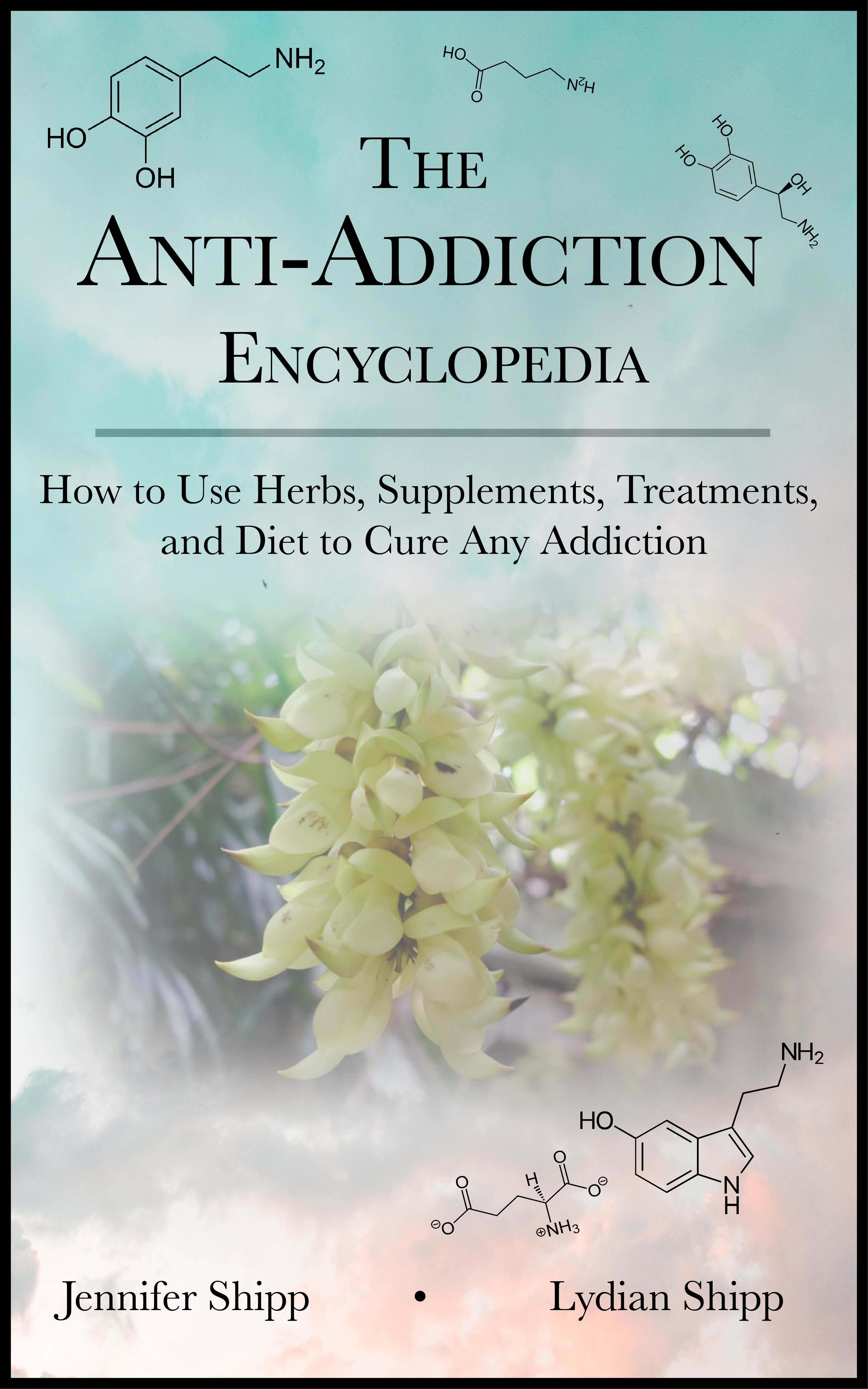
Click here to buy The Anti-Addiction Encyclopedia.
The Mucuna pruriens Protocol: Overcome Dementia, Addiction, ADHD, Mood and Mental Health Disorders
Resources:

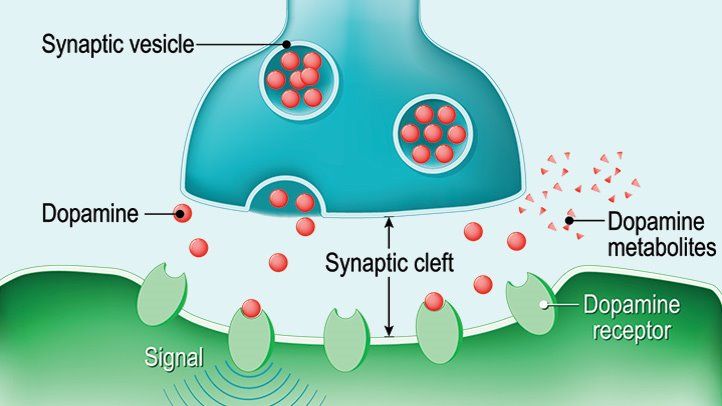 If we think of the dopamine neurons where the synaptic vesicles are located as a watering can for the dopamine receptors which are like flowers, it's easy to imagine how a slow and steady trickle of dopamine released into the synaptic cleft is ideal. A drought or a flood of dopamine would kill the dopamine receptor "flowers" which creates tolerance. Restoring and maintaining proper levels of dopamine to the neuron regrows dopamine receptors within 5-6 months of regular, daily doses of nutrients and herbs.
If we think of the dopamine neurons where the synaptic vesicles are located as a watering can for the dopamine receptors which are like flowers, it's easy to imagine how a slow and steady trickle of dopamine released into the synaptic cleft is ideal. A drought or a flood of dopamine would kill the dopamine receptor "flowers" which creates tolerance. Restoring and maintaining proper levels of dopamine to the neuron regrows dopamine receptors within 5-6 months of regular, daily doses of nutrients and herbs.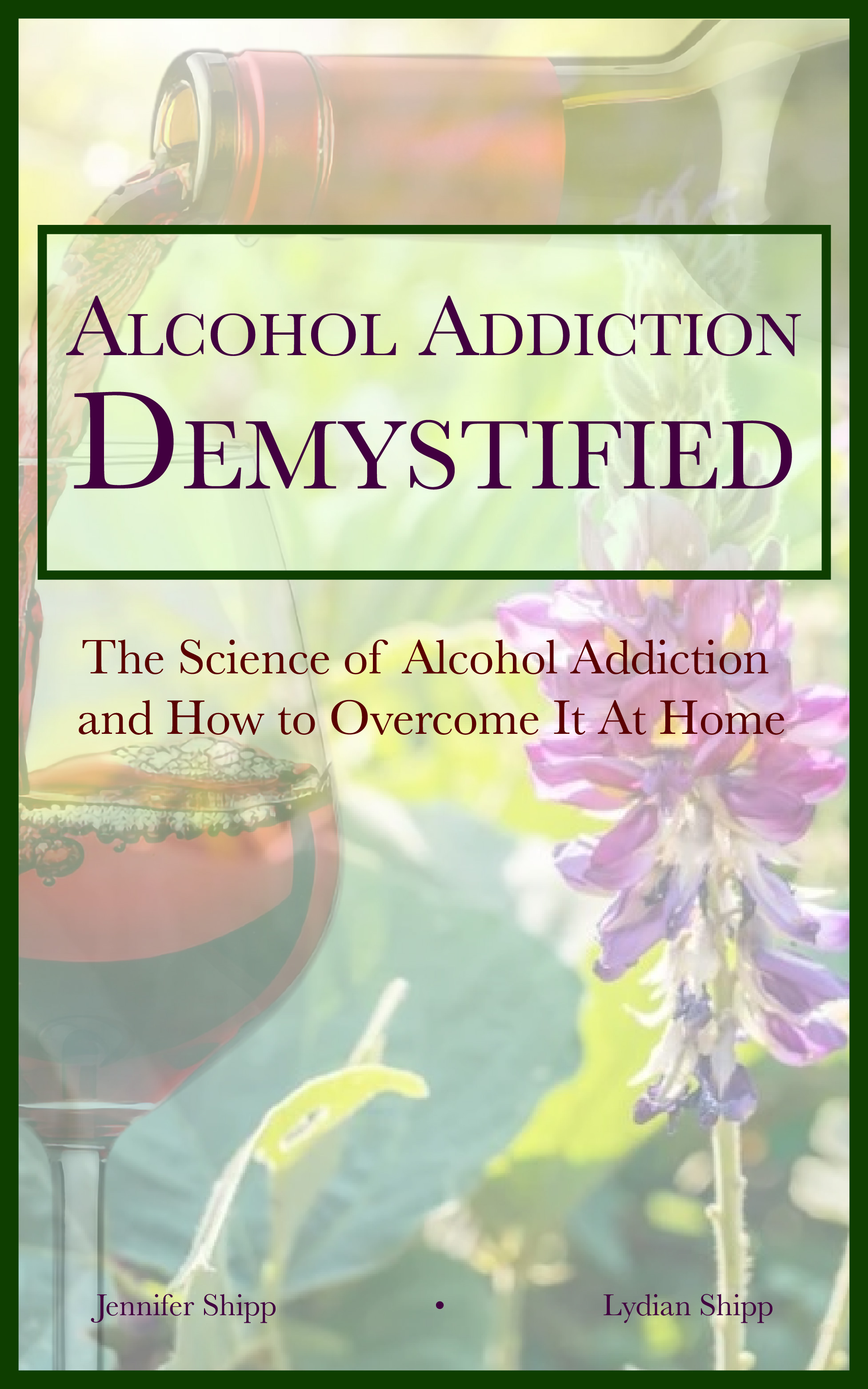 Alcohol Addiction Demystified: The Science of Alcohol Addiction and How to Overcome It At Home - BUY HERE!
Alcohol Addiction Demystified: The Science of Alcohol Addiction and How to Overcome It At Home - BUY HERE!